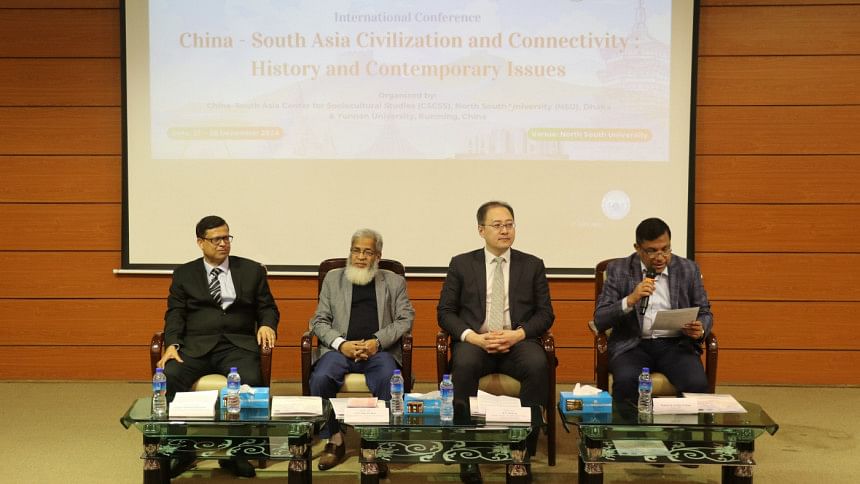CSCSS international conference wraps up at North South University

The second day of the international conference on "China - South Asia Civilization and Connectivity: History and Contemporary Issues", jointly organised by the China-South Asia Center for Sociocultural Studies (CSCSS) of the South Asian Institute of Policy and Governance (SIPG) at North South University (NSU), Bangladesh, and Yunnan University, China, concluded successfully with discussions across key themes addressing historical, cultural, geopolitical, and socio-economic aspects of the region.
The opening ceremony was graced by distinguished guests, Md Touhid Hossain, Adviser for Foreign Affairs of the Interim Government of Bangladesh, as the Chief Guest, and Yao Wen, Ambassador Extraordinary and Plenipotentiary of the People's Republic of China to Bangladesh, as the Guest of Honour. Professor Abdul Hannan Chowdhury, the Vice Chancellor of NSU, graced the occasion as Session Chair.
The ceremony began with a warm welcome speech by Prof. Sk Tawfique M Haque, Director of SIPG and CSCSS, followed by remarks from Prof. Mohammed Nuruzzaman from NSU as the Conference Convener. Special Guests Prof. He Ming from Yunnan University, Han Kun, Deputy Country Manager of PowerChina, and Zhao Shibo, Vice President of the Overseas Chinese Association in Bangladesh, highlighted the importance of fostering deeper socio-cultural and academic collaboration between China and South Asia.
The second day featured thematic sessions on political and diplomatic dynamics, media and communication, economic and trade connections, AI and cyber diplomacy, and health and medicine, fostering robust dialogue and insights on regional challenges and opportunities.
Discussions were held on the Rohingya crisis, security dilemma, and counterterrorism centred on the humanitarian and security challenges posed by the Rohingya crisis in Bangladesh. Md Mahbubur Rahman analysed the socio-political impacts of the refugee influx, while Md Rashidul Islam Rusel emphasised the need for ethical frameworks to address these challenges. Dr Shabana Fayyaz explored integrating counterterrorism strategies with economic development to protect the Belt and Road Initiative (BRI) projects.
The public perceptions and bilateral relations sessions highlighted the role of media narratives and public sentiment in shaping regional relations. Presentations by Muhammad Ahmad Khan, Akram Hossain, and Syed Shahnawaz Mohsin underscored the need for ethical journalism, improved media literacy, and cultural diplomacy to foster stronger ties among South Asian nations. Discussions explored the strategic significance of the Indo-Pacific and Bay of Bengal regions amidst growing geopolitical rivalries. Imtiaz A Hussain and David Jiang analysed the interplay between economic initiatives like the BRI and security concerns, emphasising the need for regional cooperation and stability.
Participants examined how the BRI could strengthen cultural ties and promote mutual understanding. Presentations emphasised leveraging historical legacies for modern connectivity and aligning BRI goals with local priorities to ensure sustainable development.
The concluding session, chaired by Prof. Abdur Rob Khan, Treasurer and Pro Vice-Chancellor of NSU, featured a summary of key outcomes by Prof. Mohammed Nuruzzaman. Li Shaopeng, Cultural Counsellor of the Chinese Embassy in Dhaka, emphasised the value of academic collaborations in fostering regional prosperity and connectivity.
The two-day event hosted over 125 participants, including scholars, policymakers, and international experts, reflecting NSU's commitment to fostering academic dialogue and regional cooperation. The conference underscored the importance of building bridges between China and South Asia to address shared challenges and opportunities.

 For all latest news, follow The Daily Star's Google News channel.
For all latest news, follow The Daily Star's Google News channel. 



Comments